In Xanadu…
There are some places on this earth that have a magic in their name. Samarkand. Timbuktu. Xanadu…
And, as Xanadu is pretty much on the way from Harbin to Mongolia, it would have been remiss of us not to visit.
Well, I think Xanadu has a magic in the name. If you grew up with Coleridge, Frankie Goes to Hollywood or Olivia Newton-John, Xanadu has a magic in the name.
If you are, say, my spawn, and twelve, the magic of Xanadu is rather less obvious.
“So WHY are we going there again?”
“Because it was Kublai Khan’s summer palace! And Marco Polo went there. And Coleridge wrote a poem about it! ‘In Xanadu did Kublai Khan / A stately pleasure-dome decree…’”
“But there isn’t anything there!”
“That’s not the POINT!” I say. “It’s like Troy. Well, there’s a bit less there than Troy. But, like Troy, it’s iconic.”
“So we are getting off the train and travelling 90k to see a grassy steppe, basically?” Zac observes. “Do you not think we’ll see enough steppes in Mongolia? Are we somehow, perhaps, short of steppes? Do we REALLY need to see another patch of grass?”
“Yes,” I say. “And that is non-negotiable. We are GOING to Xanadu, whether you like it or not.”
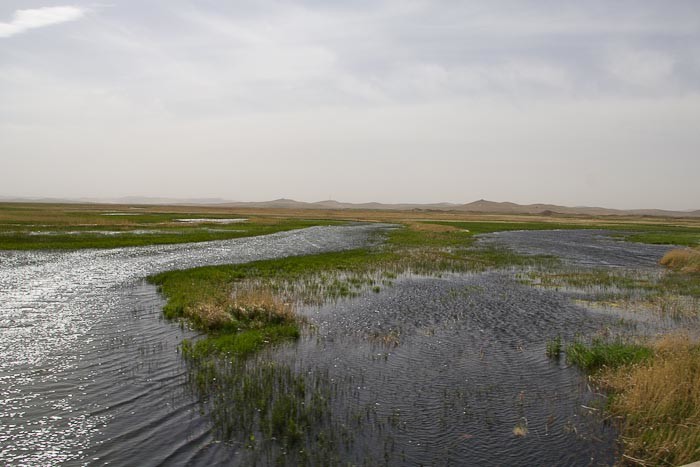
Xanadu! Also has water by it.
In fairness, it is not just my spawn who is mystified by our destination. It’s a long old ride from Changchun to Sanggendalai, and not one of our curious fellow-travellers understands why we’re doing it.
“Shangdu!” I say.
Blank stares.
I point at the characters on my book about Xanadu. Still no dice.
“Hubilai Sehan’s palace!” I say, in resolutely rubbish Chinese. “Very famous in England! Famous English writer wrote about it. Very famous!”
Nope.
We are not only in reach of Xanadu, but on the sodding train to Xanadu, and not one person we meet has heard of it.
Nor have they heard of Sanggendalai, an absolute armpit of a Chinese village with some very undistinguished gers, which is our stop for this magical place.
We jump a shared taxi to Lanqi, the nearest town of any size to Xanadu, drop off our companions at a grim industrial dormitory, and head to an absolutely gigantic tourist hotel in which we are, it appears, the only guests.
They haz internet!
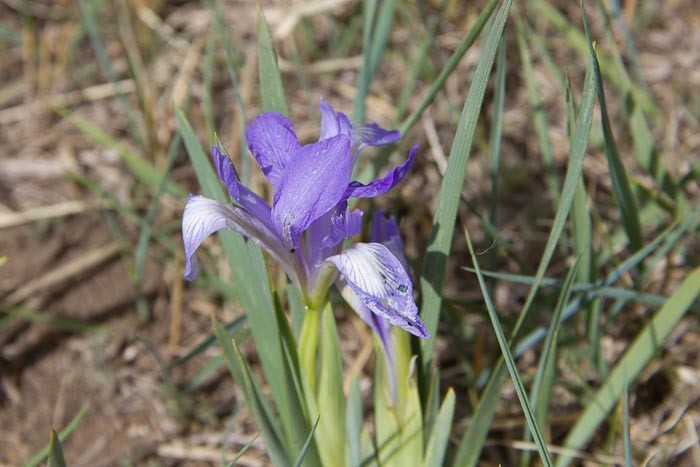
Wildflowers. Also a highlight of Xanadu.
“Right, son,” I say, the next morning. “THIS is the song I was talking about.”
I pull up Frankie Goes To Hollywood’s Relax on YouTube.
“That video was banned?!” Zac exclaims. “Was homosexuality still illegal in the 80s?”
“No,” I say. “It was decriminalised in 1968.”
He rolls his eyes. “So, what, they thought that video might turn people gay? You can’t TURN people gay.”
That’s odd. Relax doesn’t mention Xanadu. I try again.
“Listen to THIS one,” I say, pulling up Welcome to the Pleasuredome, with its epic 80s intro quoting Coleridge.
I don’t know what people did before Google. Bought songs, probably.
I force Coleridge’s poem on him.
“It’s too long,” he says. “He should have stopped about sixteen lines in.”
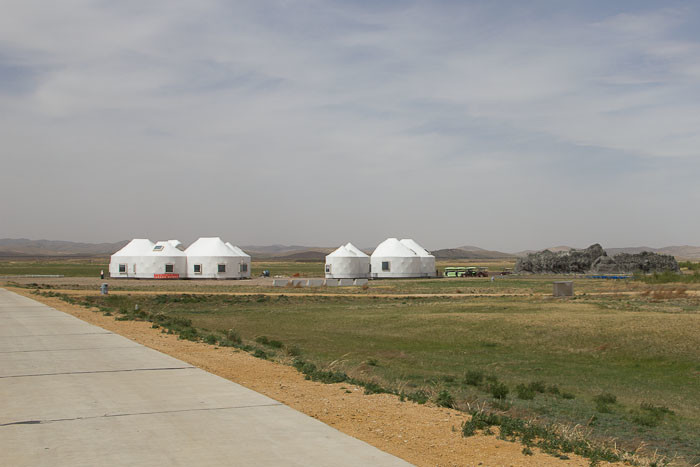
Weird metal gers. All you can see of Xanadu when the gate is locked.
We arrange a taxi to the site of Xanadu, a cluster of weird metal semi-gers, an enormous and epically obese Kublai surrounded by horses and, oh god, some firmly closed gates.
“No problem!” says our driver, optimistically. “Wait here! Someone will come.”
We settle down in a ger, the tents that Turks call “yurts” and the Chinese “Mongolian buns”, admiring the wonderful simplicity of a portable home, just felt, trellising and roof poles, that can shield you from the Mongolian winter.
Kublai Khan’s summer palace was a giant replica of a ger that could be reassembled whenever his court followed the long road from Beijing, and an absolutely awe-inspiring feat of engineering.
Kublai, incidentally, is the icon of Chinese Mongolia. The heir of Chingghis Khan, the Mongolian national hero whose cavalry brought him the largest empire ever known, Kublai made possible cultural exchanges between the developed East and the primitive West, bringing the Renaissance everything from stringed instruments to gunpowder.
We consider the Mongol hordes savages. In fact, the Chinese dynasty presided over an era of incredible peace and openness. Not, of course, that one would want to cross them…
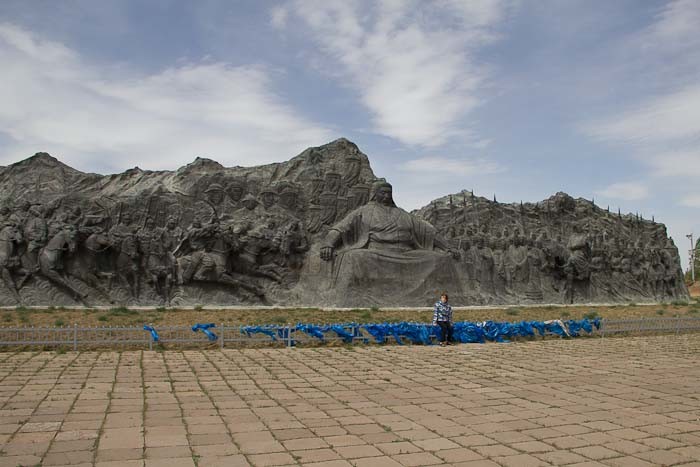
Neither Chingghis nor Kublai Khan were slim in later life.
And, in Xanadu, Kublai’s summer city, we wait. We wait. And then we wait some more.
I ask our driver if I can just climb over the fence, as I can actually see people moving around the metal gers.
No, of course I can’t. We’re in China and things don’t work that way.
Bugger.
Eventually, a lorry emerges. Some concreting appears to have been happening, with the sort of blithe disregard for future archaeologists in which China, sadly, specialises.
And here we are, in Xanadu, a grassy plain with the vague remains of an enormous city gate, the platform on which Kublai’s palace once stood, the faded outlines of walls and houses, and one elaborate marble carving that demonstrates the grandeur that once was.
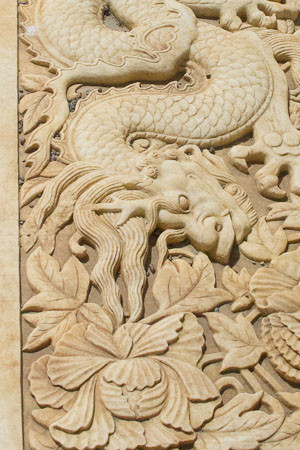
“Look!” I yell. “Tumbleweed!”
We are both, insanely, more excited by actually seeing tumbleweed, rolling across the tarmaced path where Kublai’s cavalry once paraded, than by Xanadu itself.
An eagle hunts overhead, diving and rising, on the trail of the tiny birds that nestle in the waving grass. An enormous hare bounds across the land – in Kublai’s time, his palace was surrounded by hunting grounds, and not far from here folk still hunt hare with birds as Kublai did.
We wander the enormous site, a substantial city in its day, and Zac takes it on himself to race down the main street.
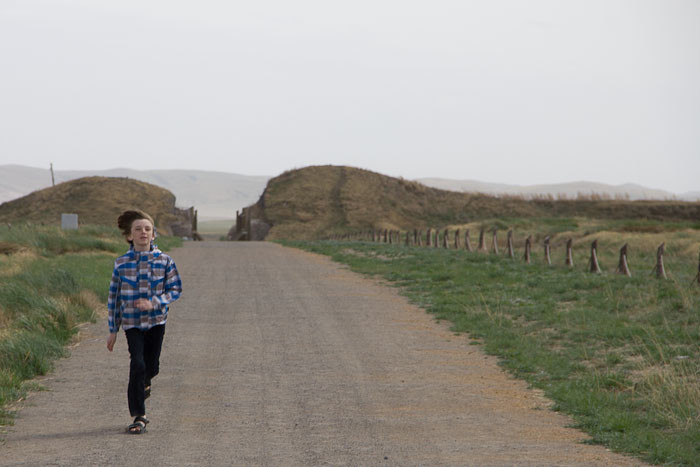
Zac running away from Xanadu.
And then we’re done. Back in the taxi, back to Lanqi, where a giant statue of Kublai on horseback dominates the vast and windswept central square.
“Well,” I say over dinner in our deserted hotel. “What do you think of Xanadu?”
“Meh,” says the boy. “But the mutton is good.”
